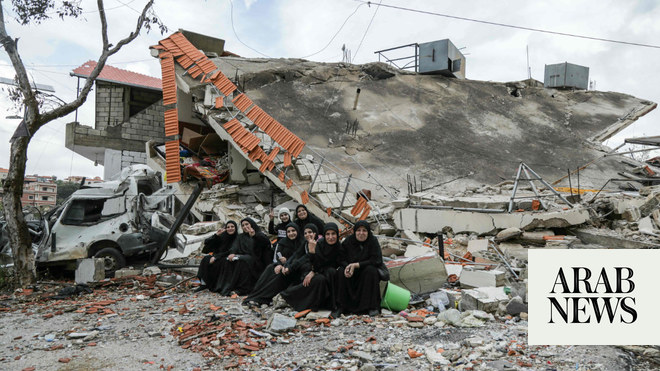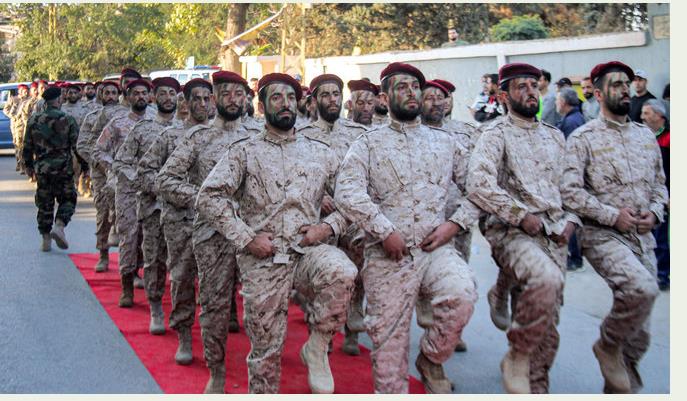
Lebanon pager explosions "an extremely concerning escalation", says UN official
The UN’s special coordinator for Lebanon, Jeanine Hennis-Plasschaert, said the pager explosions across the country marked “an extremely concerning escalation in what is an already unacceptably volatile context.”
In a statement, she urged “all concerned actors to refrain from any further action, or bellicose rhetoric, which could trigger a wider conflagration that nobody can afford”.
Hennis-Plasschaert "underlines the urgency of restoring calm and calls on all concerned actors to prioritize stability as paramount,” the statement continues, concluding that “too much is at stake to do anything less.”
Summary of the day so far
Pagers used by hundreds of members of the Lebanese armed group Hezbollah exploded simultaneously in Lebanon and Syria on Tuesday, killing at least nine people and wounding thousands in a dramatic and unprecedented attack at a time of heightened tensions in the Middle East.
Among those killed was an 10-year-old girl, according to Lebanon’s health minister, Firass Abiad. The latest casualty figures by officials include about 2,750 wounded, with most injuries to the face and hands. Those wounded include Iran’s ambassador to Beirut, Mojtaba Amani.
Hezbollah fighters in Syria were also injured in the attack, with several reportedly being treated in hospitals in Damascus. Iran’s Revolutionary Guards-affiliated Saberin News reported that some guards in Syria had also been killed.
The pager explosions across Lebanon marked “an extremely concerning escalation,” the UN’s special coordinator for Lebanon, Jeanine Hennis-Plasschaert, said. The spokesperson for the secretary general of the United Nations, Stéphane Dujarric, noted the “extremely volatile” context.
A Hezbollah official said the detonation of the pagers was the biggest security breach for the group in nearly a year of conflict with Israel. The blasts appeared to exploit the low-tech pagers that Hezbollah has adopted in order to prevent the targeted assassinations of its members. Lebanon’s foreign minister, Abdallah Bou Habib, said the country was bracing for a major retaliation by Hezbollah.
Hezbollah has vowed to retaliate against Israel. “We hold the Israeli enemy fully responsible for this criminal aggression that also targeted civilians,” a statement said. The son of the Hezbollah MP Ali Ammar reportedly also died in the explosions, as did two sons of other prominent Hezbollah figures.
There was no immediate comment from the Israeli military on the blasts. The attack took place just hours after Israel announced it was broadening the aims of the war sparked by the 7 October Hamas attacks to include its fight against Hezbollah.
Lebanon’s health ministry put hospitals across the country on “maximum alert” and instructed citizens to distance themselves from wireless communication devices. Schools in Lebanon will close on Wednesday.
The US government said it “was not aware of this incident in advance”. The state department spokesperson, Matthew Miller, told a briefing that Washington was not involved and did not know who was responsible. He added it was “too early to say” how it would affect Gaza ceasefire talks.
Israel’s domestic security agency said it had foiled a plot by Hezbollah to assassinate a former senior Israeli defence official in the coming days. The Shin Bet agency said it had seized an explosive device attached to a remote detonation system, using a mobile phone and a camera, that Hezbollah had planned to operate from Lebanon.
Israeli tanks fired on an aid convoy on a mission to northern Gaza at the weekend, the head of the World Health Organization, Tedros Adhanom Ghebreyesus, said. Shots were fired from two Israeli tanks near the WHO-led convoy, he said, adding that nobody was hurt during the incident.
Gaza’s health ministry has identified 34,344 Palestinians killed by Israeli attacks in the territory, publishing a list of names, ages, gender and ID numbers that cover more than 80% of those who have been killed in the war so far.
At least 41,252 Palestinian people have been killed and 95,497 injured in Israeli strikes on Gaza since 7 October, the Gaza health ministry said on Tuesday. The Palestinian education ministry said 11,001 students – from schools and universities – have been killed and 17,772 injured in the Gaza Strip and the occupied West Bank since 7 October 2023.
The EU’s foreign policy chief, Josep Borrell, has urged for more pressure on Israel and Hamas for a ceasefire in Gaza, warning that every day that passes without a deal risks the lives of hostages and civilians – as well as a regional war breaking out.
Israel’s prime minister, Benjamin Netanyahu, is reportedly contemplating dismissing his defence minister, Yoav Gallant, and replacing him with Gideon Saar, a member of the opposition and the New Hope party leader.
Most of the injuries from Tuesday’s pager explosions in Lebanon have been to the face and hands.
Most “appear to be to the face and especially to the eyes, and also the hand with some amputations, whether it’s in the hands or the fingers,” Lebanon’s public health minister Firass Abiad told the BBC.
The “vast majority” presenting to emergency rooms are in civilian clothes, Abiad told the broadcaster, adding that this makes it “very difficult to discern whether they belong to a certain entity like Hezbollah or others”. He added:
But we are seeing among them people who are old or people who are very young, like the child who unfortunately died, and there are some of them who are health care workers.
Abiad said the incident was a “major escalation at a time when everybody was hoping that things were moving to a kind of cessation of hostilities or some kind of ceasefire”, adding that Israel was the “obvious culprit”.
There has been no comment from the Israeli military on the blast.
"This is unacceptable": WHO chief says Israeli tanks fired on Gaza aid convoy
The head of the World Health Organization, Tedros Adhanom Ghebreyesus, said Israeli tanks fired on an aid convoy on a mission to northern Gaza at the weekend.
Posting on X, he wrote that a WHO-led convoy encountered two Israeli tanks while on the way back from a mission last Saturday.
Shots were fired from the tanks near the convoy, he said, adding that the convoy had received clearance. Nobody was hurt during the incident, he said.
“This is unacceptable,” he said, noting that humanitarian workers in Gaza deliver critical aid “amid extreme danger and life-threatening conditions”. He added:
The minimum they deserve for their service is safety. The deconfliction mechanism needs to be adhered to. Ceasefire!
The airline Lufthansa announced it is suspending all flights to Tel Aviv and Tehran through to Thursday, citing the “recent change in the security situation”. A statement by Lufthansa reads:
During this period, the Israeli and Iranian airspace will also be bypassed by all Lufthansa Group Airlines.
It added that it was closely monitoring the situation and “will assess it further in the coming days”.
Hamas has condemned the series of pager explosions across Lebanon and Syria in a statement. The statement reads:
We appreciate the struggle and sacrifices of our brothers in Hezbollah, and their insistence on continuing to support and back our Palestinian people in Gaza, and we affirm our full solidarity with the Lebanese people and our brothers in Hezbollah.
Lebanon pager explosions "an extremely concerning escalation", says UN official
The UN’s special coordinator for Lebanon, Jeanine Hennis-Plasschaert, said the pager explosions across the country marked “an extremely concerning escalation in what is an already unacceptably volatile context.”
In a statement, she urged “all concerned actors to refrain from any further action, or bellicose rhetoric, which could trigger a wider conflagration that nobody can afford”.
Hennis-Plasschaert "underlines the urgency of restoring calm and calls on all concerned actors to prioritize stability as paramount,” the statement continues, concluding that “too much is at stake to do anything less.”
Pager explosions: what we know so far
Pagers used by hundreds of members of the Lebanese armed group Hezbollah exploded simultaneously in Lebanon and Syria on Tuesday, killing at least nine people and wounding thousands in a dramatic and unprecedented attack at a time of heightened tensions in the Middle East.
Here’s what we know so far:
At least nine people were killed in the attack in Lebanon, officials said. Among those killed was an 10-year-old girl, according to Lebanon’s health minister, Firass Abiad. The latest casualty figures by officials include about 2,750 wounded. Those wounded in the attack include Iran’s ambassador to Beirut, Mojtaba Amani.
Hezbollah fighters in Syria were also injured in the attack, with several reportedly being treated in hospitals in Damascus. Iran’s Revolutionary Guards-affiliated Saberin News reported that some guards in Syria had also been killed.
A Hezbollah official said the detonation of the pagers was the “biggest security breach” for the group in nearly a year of conflict with Israel. The blasts appeared to exploit the low-tech pagers that Hezbollah has adopted in order to prevent the targeted assassinations of its members. The pagers were reportedly a new brand.
Hezbollah has vowed to retaliate against Israel. Hezbollah said two of its fighters were among the dead and threatened a “just punishment” for Israel. “We hold the Israeli enemy fully responsible for this criminal aggression that also targeted civilians,” the group said. The son of the Hezbollah MP Ali Ammar reportedly also died in the explosions, as did two sons of other prominent Hezbollah figures.
There was no immediate comment from the Israeli military on the blasts. The attack took place just hours after Israel announced it was broadening the aims of the war sparked by the 7 October Hamas attacks to include its fight against Hezbollah.
The attack followed months of targeted assassinations by Israel against senior Hezbollah leaders.
Lebanon’s health ministry put hospitals across the country on “maximum alert” and instructed citizens to distance themselves from wireless communication devices. Hezbollah maintains its own communication network separate from the rest of Lebanon.
It also comes as US officials try to de-escalate tensions between the two sides, and could derail US efforts to prevent Iran from retaliating against Israel for the July bombing in Tehran that killed the Hamas political leader Ismail Haniyeh.
The US said it “was not aware of this incident in advance”. A US state department spokesperson, Matthew Miller, told a briefing the US was not involved and did not know who was responsible. He added that it was “too early to say” how it would affect Gaza ceasefire talks.
After the pagers blasts, a Reuters journalist saw ambulances rushing through the southern suburbs of Beirut, a Hezbollah stronghold, amid widespread panic.
At Mount Lebanon hospital just outside Beirut, a Reuters reporter saw motorcycles rushing to the emergency room and people with bloodied hands screaming in pain.
The head of the Nabatieh public hospital in the south of the country, Hassan Wazni, told Reuters that around 40 wounded people were being treated at his facility. The wounds included injuries to the face, eyes and limbs.
Here are some of the latest images from the newswires from Lebanon, after at least nine people were killed and almost 3,000 others wounded during the pagers explosion on Tuesday.
Pentagon says US had no involvement in explosions
A Pentagon spokesperson said the US had no involvement in Tuesday’s pager blasts in Lebanon.
Air force Maj Gen Patrick Ryder told a news briefing:
To my knowledge, there’s no US involvement in this at all. Again, it’s something that we’re monitoring.
Schools in Lebanon will close on Wednesday, according to state media, after the pager explosions killed at least nine people and injured 2,800 on Tuesday.
The pagers that exploded were new and had been bought by Hezbollah in recent months, a Lebanese security source told CNN.
The source did not provide any information on the exact date the pagers were purchased or their model.
A Hezbollah official told Associated Press that the pagers used by the group first heated up, then exploded.
A former British Army munitions expert told the BBC that the devices would have likely been packed with between 10 and 20 grams each of military-grade high explosive, hidden inside a fake electronic component. This would have been armed by a signal, something called an alphanumeric text message, according to the expert.
Gaza publishes identities of 34,344 Palestinians killed in war with Israel
Gaza’s health ministry has identified 34,344 Palestinians killed by Israeli attacks in the territory, publishing a list of names, ages, gender and ID numbers that cover more than 80% of those who have been killed in the war so far.
The remaining 7,613 people included in its death toll, now more than 41,000, are Palestinians whose bodies have been received by hospitals and morgues, but whose identities have not yet been confirmed.
The dead range from the very young to the very old. They include 169 babies born after the Hamas attacks of 7 October that began the war whose lives were shorter than the war that claimed their lives, and a man born in 1922 who survived more than a century of war and upheaval before he was killed.
The document runs to 649 pages, with the dead listed largely by age. Gaza’s population is youthful, and the grim register underlines the high toll of Israeli attacks on Palestinian children.
The US continues to believe that there needs to be a diplomatic solution to the ongoing conflict between Israel and Hezbollah, White House spokesperson Karine Jean-Pierre said on Tuesday.
Lebanon’s Hezbollah promised to retaliate after blaming Israel for detonating pagers on Tuesday that killed at least nine people and wounded 2,750 others, including many of the militant group’s fighters and Iran’s envoy to Beirut.
“So we continue, we continue to believe that there … should be a diplomatic resolution to this,” Jean-Pierre said.
Analysis: If caused by the Mossad, explosions would be a big escalation
It may not have been acknowledged by Israel, but the extraordinary, coordinated attack on Hezbollah, blowing up thousands of pagers used by members of the Lebanese group, is almost certainly a Mossad operation.
The Israeli intelligence service has been engaged in the assassinations of Hamas and Hezbollah leaders for decades but, if its involvement is confirmed, this represent a significant escalation.
Reports continue to come in but, with at least nine dead and about 3,000 wounded in dozens, if not hundreds, of coordinated explosions, the episode demonstrates a ruthless – if indiscriminate – desire to target Hezbollah. The group had been using pagers as an alternative to mobile phones, which can be tracked and used to pinpoint deadly missile strikes on its commanders.
It is unclear how the explosions were caused and, although there is inevitable speculation about hacking, it is most likely they came from sabotaged devices. Initial reports said that the pagers that exploded were a new model manufactured by a company whose supply chain may have been compromised by the perpetrators of the attack.
Yossi Melman, co-author of Spies Against Armageddon and other books on Israeli intelligence, emphasised that it appeared the exploding pagers had been “recently supplied”, and added: “We know that Mossad is able to penetrate and infiltrate Hezbollah time and time again.” But he questioned the strategic wisdom of the attack, in which a 10-year-old girl died.
Hamas has condemned the series of pager blasts across Lebanon as part of Israel’s “aggression” in the region, saying they were an escalation that would only lead Israel to “failure and defeat”, according to a statement released by the group.
The United States said on Tuesday it is gathering information after at least eight people were killed and 2,750 wounded when pagers used by Hezbollah members – including fighters and medics – detonated simultaneously across Lebanon.
State department spokesperson Matthew Miller told a regular news briefing the United States was not involved in the incidents and did not know who was responsible.
Lebanon’s Hezbollah threatened to punish Israel in response to the incidents, Reuters reported.
Lebanon foreign minister threatens retaliation after pager explosions
Lebanon’s foreign minister, Abdallah Bou Habib, said the country was bracing for a major retaliation by Hezbollah.
Bou Habib told the New York Times:
If Israel thinks by this that they’re going to return their displaced people from the north of Israel, they are mistaken. This escalates this war.
He added that the Lebanese government was now preparing to lodge a complaint at the UN security council.
Hezbollah are definitely going to retaliate in a big way. How? Where? I don’t know.












